Technology investors have placed enormous faith in Singapore, one of the Four Asian Tigers in the late 20th century alongside Hong Kong, South Korea and Taiwan, thanks to its political stability and robust legal and regulatory framework.
The country’s diverse cultural traditions with four official languages – English, Mandarin, Malay and Tamil – also makes it an ideal global financial centre.
Saemin Ahn, the Singapore-based managing partner for Rakuten Ventures, a corporate venture capital (CVC) vehicle for Japan-headquartered e-commerce group Rakuten, said: “I think Singapore’s uniqueness has been the government’s ability to rally around the strong urge to invest in technology and encourage companies to place their assets and operations in Singapore.
“This initially created an impressive human resources concentration of finance professionals that later helped tech professionals and entrepreneurs implant their platforms in the country.
“With this persistent tailwind of regulatory and economically incentivised support, along with a singular interest in southeast Asia’s developing market for all stacks of investments Singapore enjoys a default headquarters status for many of the startups in the region.”
Singapore ranked second most innovative economy in southeast Asia, east Asia and Oceania, after South Korea and before China, according to the Global Innovation Index (GII) 2021: Tracking Innovation through the covid-19 crisis, a report produced by the United Nations’ World Intellectual Property Organisation.
Globally, GII ranked Singapore in the eighth position, after Switzerland, Sweden, the United States, the United Kingdom, South Korea, the Netherlands and Finland, and ahead of Denmark and Germany. The country has been among the top 10 most innovative economies for the past 14 years.
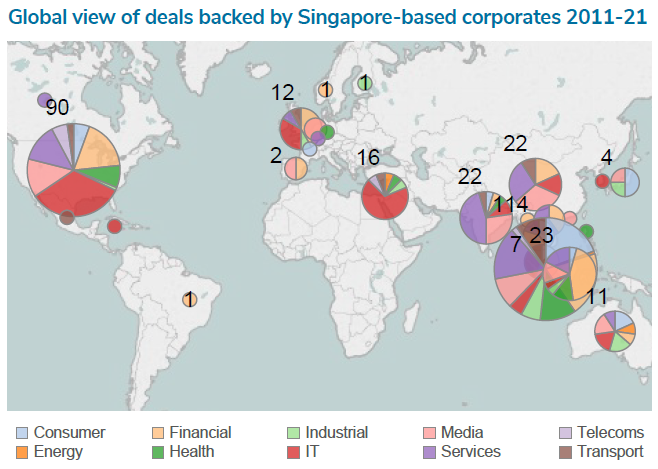
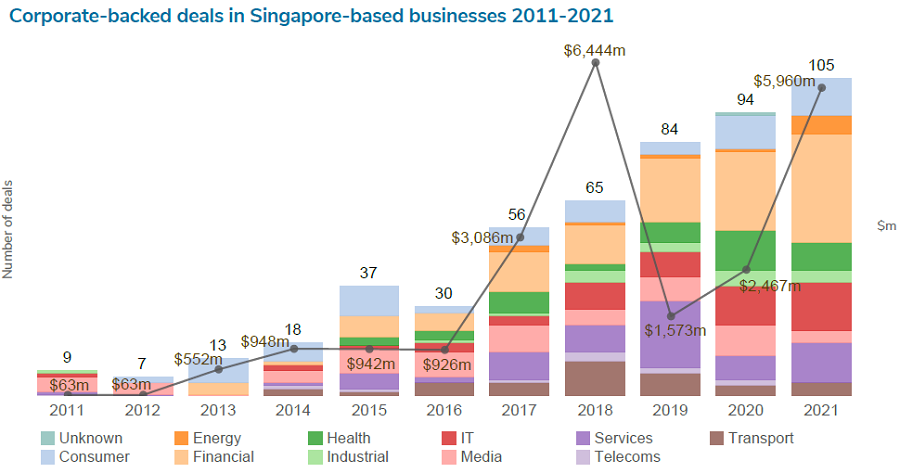
In addition to corporate venturers from China and the US, global CVC players and traditional venture capitalists are vying for relevance in disruptive areas including cloud computing and artificial intelligence in the city-state.
Singapore’s corporate-backed deal volume and value have grown exponentially in the past decade, according to Global Corporate Venturing Analytics data, having achieved a record $2.5bn funding figure across 94 deals last year and almost $6bn from 105 transactions as of October 2021.
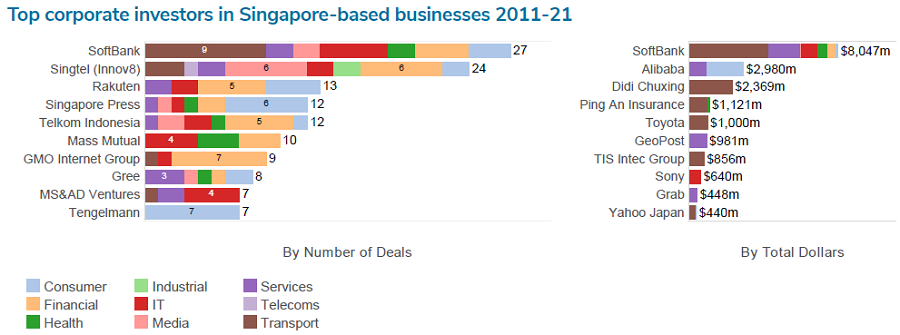
Rakuten Ventures’ Ahn added that although the Singaporean innovation ecosystem’s development has not influenced his deployment practice, “it does add a positive layer or bias in how I look at advising strategy and operations for our founders”.
Among the most active CVC investors in Singapore are telecommunications groups SoftBank (through its SoftBank Vision Funds and SoftBank Ventures Asia unit), Singapore Telecommunications (through its Singtel Innov8 subsidiary) and Rakuten (through Rakuten Capital and Rakuten Ventures).
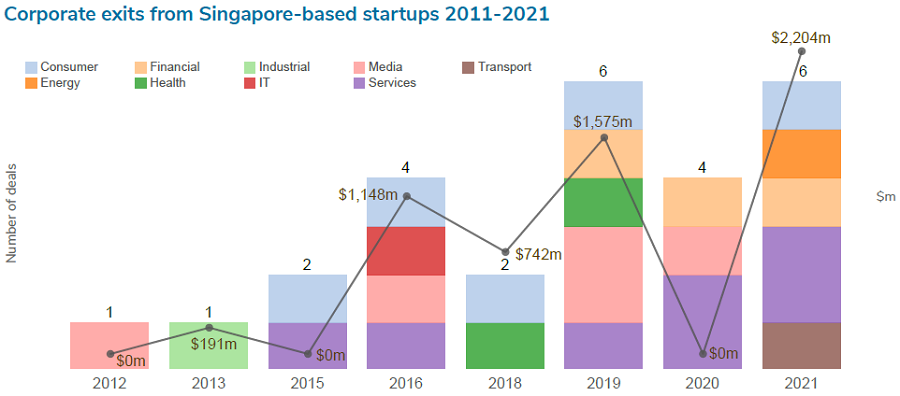
Media conglomerate Singapore Press (SPH Ventures), telecoms network Telkom Indonesia (MDI Ventures) and insurers MassMutual and MS&AD Insurance (MassMutual Ventures and MS&AD Ventures respectively) are also among the most prolific corporate investors in the country, as are internet company GMO (GMO VenturePartners), digital media firm Gree (Gree Ventures and Strive fund) and retailer Tengelmann (Tengelmann Ventures).
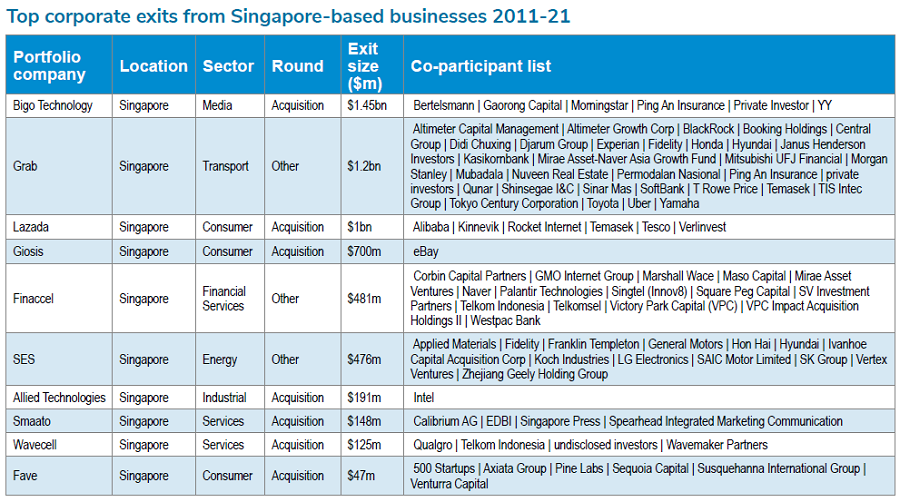
Rakuten Ventures’ Ahn added that although the Singaporean innovation ecosystem’s development has not influenced his deployment practice, “it does add a positive layer or bias in how I look at advising strategy and operations for our founders”.
Among the most active CVC investors in Singapore are telecommunications groups SoftBank (through its SoftBank Vision Funds and SoftBank Ventures Asia unit), Singapore Telecommunications (through its Singtel Innov8 subsidiary) and Rakuten (through Rakuten Capital and Rakuten Ventures).
Media conglomerate Singapore Press (SPH Ventures), telecoms network Telkom Indonesia (MDI Ventures) and insurers MassMutual and MS&AD Insurance (MassMutual Ventures and MS&AD Ventures respectively) are also among the most prolific corporate investors in the country, as are internet company GMO (GMO VenturePartners), digital media firm Gree (Gree Ventures and Strive fund) and retailer Tengelmann (Tengelmann Ventures).
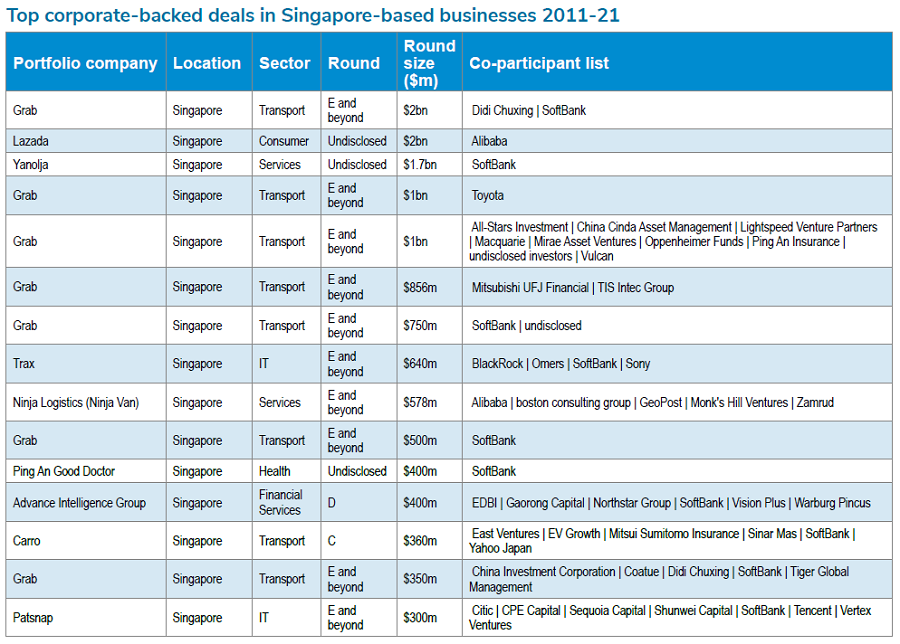
In terms of corporate-backed Singaporean companies’ exits, this year has seen the largest figure at $2.2bn across six events as of September this year.
Since GCV Analytics began tracking data, the most notable exits involving corporate backers have included ride hailing service Grab, consumer credit provider Finaccel and lithium-metal battery developer SES have agreed to reverse merger deals with publicly-listed special purpose acquisition companies. Meanwhile, companies including social video live streaming platform Bigo Technology and e-commerce platform operators Lazada and Giosis were all acquired.
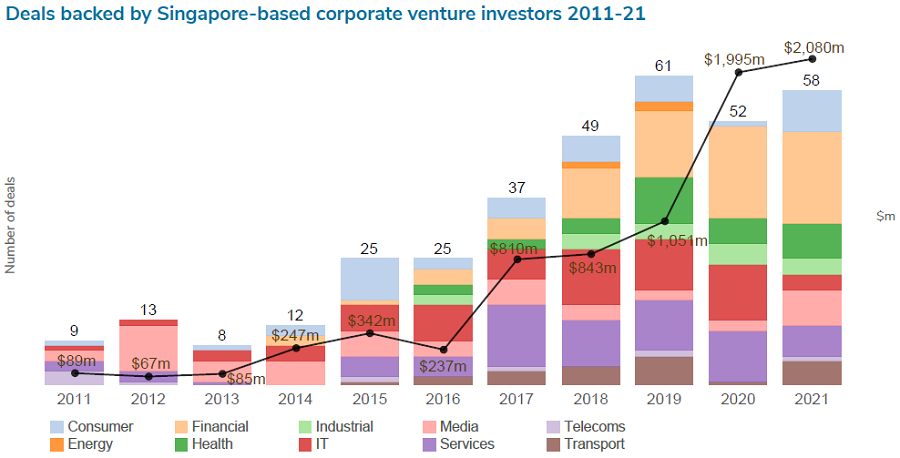
Top corporate-backed deals in Singapore have included rounds raised by Grab, Lazada, travel and accommodation services provider Yanolja, intelligent retail technology provider Trax, logistics service provider Ninja Logistics (Ninja Van), insurer Ping An’s Good Doctor subsidiary, fraudulent payment prevention technology developer Advance Intelligence Group, automotive e-commerce platform Carro and innovation data aggregator Patsnap.
Regarding ecosystem collaborations, Rakuten Ventures’ Ahn said: “Everyone is here to cheer on great companies, management and founders. With that, we will work aggressively with any company or organisation that has the right fit with Rakuten Ventures in finding good companies and great ideas.”
